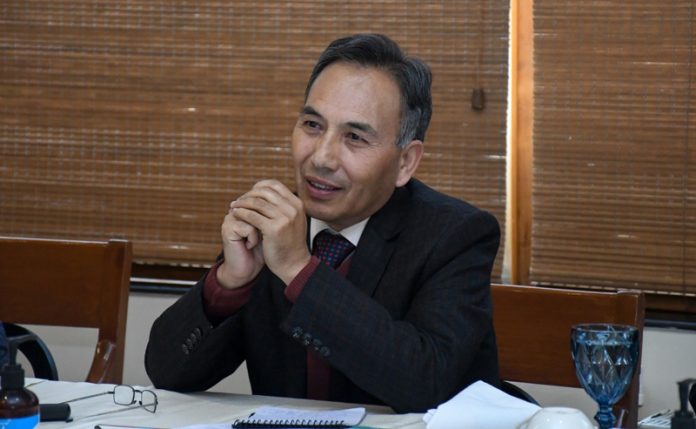Excelsior Correspondent
JAMMU, Sept 3: With an intent to curb and decrease the pendency of five years plus old cases and to ensure equitable and rationalized distribution/allocation of oldest cases among the Judicial Officers, the Acting Chief Justice of J&K and Ladakh High Court Justice Tashi Rabstan has issued additional guidelines for adherence by the District Judiciary.
As per the circular issued by Registrar General, the Principal District Judges of each district shall constitute a ‘District Case Management Committee’ presided over by himself, a senior Additional District Judge (if available) and a Senior Civil Judge preferably CJM to supervise the case management strategy in each district.
Click Here To Join Daily Excelsior on WhatsApp And Get Latest News
The committee may invite the Judicial Officers concerned in whose courts the oldest cases are pending, the President(s), office bearers and members of the Bar Associations as well as Govt Pleaders and Public Prosecutors to the meetings if it is felt necessary;
Moreover, the District Case Management Committee shall hold periodical meetings at the District Headquarters preferably in the afternoon (after court hours) on the last working day of every month. The Judicial Officers working at places other than the District Headquarters may opt to attend the meeting through virtual mode, the circular said, adding “the Principal District Judge shall set the schedule and agenda of review meetings of the Case Management Committee on monthly basis to monitor the progress of disposal of old cases and to issue directions or make suggestions to Judicial Officers for the speedy disposal of such oldest /target cases”.
The Principal District Judge shall submit the minutes of monthly review meetings of the District Case Management Committee to the Member Secretary to the SCMS Committee by the 5th day of every month. The Member-Secretary of the Committee shall, in turn, place the same before the Committee for perusal and soliciting directions/instruction.
Moreover, the District Case Management Committee shall identify and indicate oldest cases in the courts of the Magistrates / Civil Judges & in the courts of District & Sessions Judges, identify target cases and ensure, in consultation with the Administrative .Judge of the district, the equitable & rationalized distribution of the oldest /target cases among Judicial Officers within the district regard being had to the nature of the cases and their stage of proceedings & wherever practicable the complicated cases shall be assigned to the senior & more experienced Judicial Officers.
The District Case Management Committee, as per the circular, shall also tackle the difficulty arising out of non-appearance or non-production of accused and the witnesses in criminal cases. This will ensure that the accused and the witnesses do regularly appear in the courts. Further, the District Case Management Committee shall prepare the list of the old criminal cases pending trial or disposal before different courts in the district in which the Police have failed to serve the witness summons or warrants or in which the Police are unable to ensure the presence of the accused.
The Committee can hold meeting with the District SPs and the Public Prosecutors in this regard. The Committee may, if required, request District SPs to appoint Senior Police Officers as nodal officers who shall supervise the service of summons on the witnesses in the criminal cases and ensure the presence of the accused before the courts. The Committee can also devise a mechanism at the local level in consultation with the District SPs & the Public Prosecutors which can help ensure the strict compliance with the direction of the courts for production of witnesses before the courts and for ensuring presence of the accused;
“An endeavor shall be made to dispose of the oldest case(s) on merits and easy recourse to dismissal of the matters for non-prosecution or deciding the cases ex-parte shall not be taken, unless it is absolutely warranted by the facts of the case; and the Chief Justice will personally monitor these guidelines”, read the circular.


